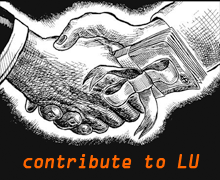10.24
In less than two weeks, LaFayette voters will decide who should represent the city for Council Ward 2 during the next four years.
Candidates seeking votes for the Ward 2 race are Ronald Underwood and incumbent Councilman Ben Bradford. Bradford was first elected in November 2011 to complete the unfinished term of former Councilman Norm Hodge.
Mr. Underwood did not provide LU with an e-mail address, so this Q&A was set up as a solo interview with Councilman Bradford. Bradford gave biographical information during his 2011 Q&A and little has changed since then, although voters unfamiliar with the now 35-year-old lawyer should review his previous answers.
![]()
LU: What’s the best way for voters/constituents to get in touch with you?
Bradford: Email is by far the best way to get in touch with me because I am able to check it at all hours. My city email account is bbradford@cityoflafayettega.org.
Phone number: 423-414-8083
You can also send me a message on Facebook, although be warned that I do not check Facebook on a regular basis.
LU: Two years ago, pre-election, you said your priorities were “to listen and to learn.” What have you learned since joining the Council in December 2011? Is being a “politician” all you expected it to be?
Bradford: The most important thing I need to say is that I plan to “listen and learn” for the rest of my life. No matter how much we think we know, there is always room for improvement. As for listening, once an elected official stops listening to the community he represents, he isn’t much of a representative.
However, I definitely have a different perspective during this campaign because I more fully understand the role of a city council member and have a more developed set of expectations for myself. I had no idea how immense and overwhelming the job would be. I understand now how naïve I was about the process of local government. Now that I am involved, I live with a healthy fear of what the government can do. I have seen first-hand that a handful of men and women can have an immense impact on my family’s life in this city. I now appreciate the importance of having people who are courageous, responsible, and of sound judgment. I have learned that doing the right thing is easy, but figuring out what the right thing is can be difficult.
Being a “politician” is more rewarding and more painful than I thought it would be. It is difficult to dedicate hours of service when it is too easy to focus on the criticism. However, the job is so inspirational to me because, in some areas, we have far more ability to help others and to do “the right thing” than I imagined. If it weren’t for this, I probably wouldn’t be running again.
LU: Answering an LU Q&A before your election, you said the following about transparency and citizen input: “It would be interesting to see more interaction between the council and the voting public. Aside from seeing individual councilors take time to visit individuals or groups, it would be beneficial to have organized meetings with specific individuals at a time – where people might feel more comfortable asking questions and council members could give better answers…”
From the outside there doesn’t seem to be much change in the last two years, other than your personal willingness to answer questions after meetings end. Are LaFayette City Council and city government doing better about listening to residents and sharing information since you wrote that response?
Bradford: We could certainly do a better job with the transparency issues, but we are really trying. Thank you for recognizing my willingness to answer questions after meetings. I have made it a point to be the last one to leave so that I can be sure that no person leaves with unanswered questions (or with an unsatisfied desire to ridicule an elected official). A couple of us are making it a point to respond to questions posted on this website, or to explain inaccuracies when they occur. We have hired a Main Street Director that is still carving out his niche in the City, but who is becoming more and more active with the City’s Facebook page.
I now believe that holding more meetings isn’t really the answer. In general, people do not have time or desire to attend meetings. This is evident at pretty much any given City Council meeting where we have the same handful of people and nobody else. I have worked, off and on, for some time now on setting up a system for council members to post their thoughts/concerns/ideas for reading by the general public. There are still hurdles, most of them being related to time, finances, and legal issues about public speech sponsored by the government, but I believe that this type of communication is the only thing that will really move us toward more transparency.
Lastly, we need to embrace the idea that LaFayette cannot achieve the appropriate level of what we think of as “transparency” without a general public that is willing to help. It amazes me at how difficult it is to mass communicate with the citizens of LaFayette. People have complained to me that they aren’t informed because they don’t come to meetings, listen to the local radio, read the newspaper or look at the internet. The government isn’t capable of implanting news directly into the brains of the voters, so some effort to be responsible and informed is still required. The City and the Citizens both need to grow more responsible in our communications, which should be a “two-way street,” if we are going to get to where we need to be on this issue.
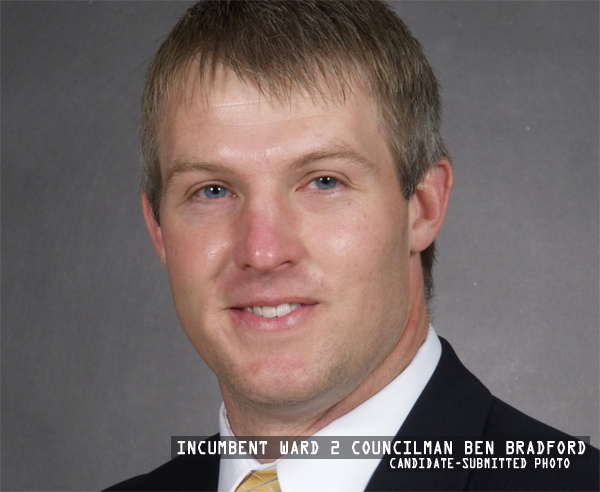
LU: What would you consider the greatest accomplishment of your time as a councilman? What, in hindsight, would you say is your biggest mistake?
Bradford: The most important thing that we have accomplished in the past two years has also been the most emotionally difficult. There is a learning curve with every system, but after I finally learned the proper questions to ask and the proper places to look in order to verify the answers, it became apparent that our City finances were out of control. We were spiraling downward, and had been for a long time.
The actions that became necessary were extremely time-consuming and emotionally difficult. There was a change in management. There was an interim manager hired. More time was spent with an accountant and countless meetings were held and reports were read. There was a moratorium on spending. None of these things were easy or popular. However, after all of the turmoil, we are finally at a place where we can begin building a reserve instead of creating debt. The 2014 budget is for bare essentials, but it keeps us out of the red. I am certainly not saying that I accomplished this alone – far from it. But, I am proud to be a part of the group that has made a difference.
A few months before we finally took action to turn things around, I began to realize just how bad our financial situation was. But, I was a new and inexperienced councilman and I was afraid to take action because I knew that the action necessary would have extreme consequences. I was afraid of making the wrong choice or of making a premature choice, and I ultimately decided to take more time before pushing the issue. In hindsight, this might have been my biggest mistake on the council because I think that it cost us all a lot of money.
LU: Once reelected, what are your top priorities and goals for the next four years?
Bradford: The top priority must be to protect our spending until we build up an emergency reserve. This will allow us to begin making smarter long-term financial decisions – such as decreased borrowing of monies. This cannot be accomplished without hiring a full-time city manager that understands business and is capable of managing a $27 million dollar operation.
LU: Answering an LU Q&A in 2011, you said the biggest problem for LaFayette is the economy. You mentioned reforms to zoning and business licenses as one way to bring in new business, along with tax incentives and marketing. You also mentioned erecting signs outside the city that would draw attention (and customers) to businesses we already have. Do you still consider the economy our biggest problem? What have you done with the council to explore those ideas to help business? What else are you working on to draw businesses in and support existing economic activity?
Bradford: Our biggest problem is not necessarily the economy, but rather the way that we have handled our finances in the current economy. I am picturing a pyramid not so different from the one used by candidate Robert Wardlaw when I say that signs and marketing are near the top of the pyramid. I have spent very little time over the past two years working on these things because our finances and basic spending philosophy, the very foundation of the pyramid, needed my immediate attention.
We have not, however, been completely inactive in this area. One example is the implementation of an “opportunity zone” in the downtown area which will allow private businesses to get low-interest loans and other incentives from the state for opening businesses in our downtown. We have also encouraged and empowered our codes department to change outdated codes. We have also re-zoned several key parcels of land to allow and encourage the appropriate type of business development.
The key to supporting existing economic activity is to maintain our personal contacts with our businesses, ask questions before we act, and listen when they need us.
Right now, I am working on a plan to aid very small businesses with their utility bills. Currently, a private business, even one with only one or two employees, pays a commercial rate for electricity. This rate is markedly higher than the rate paid by residential users. We need to consider adjusting this rate for certain very small businesses in order to remove this barrier to operating a small business inside the City.
LU: LaFayette Police Department is a huge part of the city’s annual budget, and the department is crucial to keeping residents and businesses protected. Are you satisfied with the way LPD is currently run and the job its officers are doing? How confident are you in Chief Clift?
Bradford: This is a loaded question – You know that I am a defense attorney.
It is no secret that there have been difficult personnel decisions made by the council concerning LPD and it is a different department from where it was two years ago. We are in a healing phase at the moment. LPD has seen its share of struggles, but I firmly believe that it is on its way up. There are always people who are unhappy with the police. It is, I suppose, a professional hazard for them. But, Chief Clift has done everything that we (the council) have asked of him. He is a good face for the department and is not afraid to advocate for his staff. He works well with members of the community and understands the importance of having a police force that doesn’t just write tickets, but also coordinates special events and communicates with local businesses.
I am confident that Chief Clift has the ability to make us proud of LPD.
It is a somewhat loaded question, but every single candidate for council and mayor contacted for a Q&A was asked the exact same thing about LPD and Clift. All responded positively, although Bradford’s enthusiasm seems a bit more subdued.
LU: Many city residents have been hit hard by increasing electric bills. Can you explain the city’s current situation with utility costs (especially electricity) and your role in decisions about utility pricing?
Bradford: I am on the utility committee, and I am proud to say that I have had a major role in decisions concerning utility pricing. One of the problems with our city finances is that utility rates have remained constant for years while all of our associated costs have skyrocketed because of government mandates. Just this year, the City’s costs for providing electricity alone are projected to increase one and a half million ($1,500,000.00) dollars. We were like a gas station buying gasoline for $3.50 per gallon and selling it for $3.00 per gallon. It doesn’t take an expert businessman to know that such a business practice can only lead to bankruptcy.
 I was not happy to increase rates (I pay a utility bill every month too!), but there was really no other responsible choice. The jump in rates most seriously harmed those persons on fixed incomes, but such a significant jump would harm any household budget. If rates had been raised in miniscule increments for the past ten years, we wouldn’t have had to take such drastic measures, but there is nothing I can do about that. Without an immediate action to “jerk” us back in line with our pricing, we would have all been forced to watch the City go out of the electricity business. Trust me – you wouldn’t want that to happen. We still have the lowest rates in this area. In fact, out of fifty-two electric providers in the state, we are still the thirteenth (13th) cheapest. This makes sense to me when you consider that the city uses its electricity “profits” to fund public services, while a private electric provider uses electricity profits to line the pockets of the stockholders.
I was not happy to increase rates (I pay a utility bill every month too!), but there was really no other responsible choice. The jump in rates most seriously harmed those persons on fixed incomes, but such a significant jump would harm any household budget. If rates had been raised in miniscule increments for the past ten years, we wouldn’t have had to take such drastic measures, but there is nothing I can do about that. Without an immediate action to “jerk” us back in line with our pricing, we would have all been forced to watch the City go out of the electricity business. Trust me – you wouldn’t want that to happen. We still have the lowest rates in this area. In fact, out of fifty-two electric providers in the state, we are still the thirteenth (13th) cheapest. This makes sense to me when you consider that the city uses its electricity “profits” to fund public services, while a private electric provider uses electricity profits to line the pockets of the stockholders.
It doesn’t matter if you are the government, a business, or an individual, you still have to do the math when it comes to finances. You simply cannot provide a service for less than the cost of providing the service. My opponents that criticize my math may win a popularity contest, but their philosophy leads to a much higher price in the long term for all of us.
LU: In regards to the Recreation Department, you previously said “we can get better in providing recreational services to everyone – and not just those interested in Football, Basketball, and Baseball.” Have you seen improvements in that area? Can you explain some of the recent changes made to rec. policy about uniform costs and coaching eligibility?
Bradford: Many people were concerned when registration costs started increasing, but I believe that most people have now realized that they aren’t paying any more money than before. For example, when I was first elected to the council, it cost $50.00 to register for baseball. But, the Rec. only provided a jersey to the players. So, after the draft, the coach had to go out and find a vendor for the other necessities: cap, pants, socks, etc. Then, the coach would take up money from the parents, anywhere from $30 to $70, depending on what the coach chose. This was crazy for multiple reasons. It was a hidden cost for people that thought their child could play for $50. It led to unequal pricing and uniforms for individuals. It put the coaches in danger of being accused of mishandling large amounts of money. The fix was simple. We defined a “uniform” for each sport and made sure that we charged enough at registration to cover the cost of the uniform. The increased pricing was merely to cover that cost.
The changes in coaching eligibility were due to multiple complaints about our lack of policy regarding who was allowed to coach. The original proposal from the administration was for convicted felons to be barred from coaching. After spending many hours of debate, the Recreation Advisory Board recommended that we ban felons from coaching until their civil rights are restored. I think that this is a fair compromise in that it protects the City legally by putting a policy in place while giving persons with a less than spotless history a chance to redeem themselves. Most importantly, the policy states that coaching is a privilege and not a right and gives the City the ability to protect the “best interests of the child and program” in determining who is allowed to be around children.
The bigger picture is that the City is taking baby steps to move the Recreation Department forward. The next issue to look for in the future has already been brought before the Recreation Advisory Board: Smoking in City parks. Some people think that we should ban smoking on City property altogether, while others advocate having better designated smoking areas. What do you think?
Changes to the uniform and coaching policies make sense, although a $100+ fee for youth sports is still difficult for many to handle. Some kids have uniforms from previous seasons, and some simply cannot pay the fee regardless of what it includes. If time allowed, a follow-up question would address the availability of “scholarships” for families without the means to cover entry fees.
As for smoking, it would be difficult (and oppressive) to completely ban smoking from outdoor sporting events, but better designated areas and department staff willing to evenly enforce smoking rules would help make these events more welcoming for those who don’t smoke.
Councilman Bradford did not fully address what the city is (or should be) doing for those who don’t play “Football, Basketball, and Baseball” outside of a proposed splash park, mentioned below.
LU: What are your thoughts on the amount of money LaFayette spends each year on the golf course and airport? Are these continuing expenses justifiable in light of the current economy, infrastructure needs, and rising energy costs?
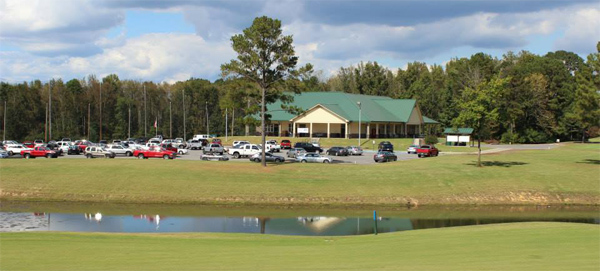
Bradford: We have to be ever-vigilant to ensure that they are held accountable for their spending – we cannot simply give them a blank check. But, controlled spending in these areas can be economically beneficial. Both the airport and the golf course have indirect benefits that are difficult to measure. In addition, the costs associated with shutting either of them down (such as damages for broken contracts) would bankrupt us at this point, since we do not have a reserve in place.
LU: Are you happy with LaFayette’s proposed SPLOST project list, and will you personally vote for the 1% sales tax to be renewed?
Bradford: I am very happy with the proposed list. I should be, since I was intimately involved with its creation. This list is one of the first opportunities I have had to meaningfully pursue some of the visions that I shared with the voters during the last election, such as renovating the old football field and creating a place for children to ride bicycles within the city. The splash park will be an exciting upgrade to our current swimming pool and the train platform will further focus attention on our downtown area. However, the first thing on the list is the most important – we plan to pave ten miles of roads within the City. These roads are already mapped out. I need to make sure that LU gets a copy of the map so that everyone here can see which streets would be paved.
I hesitate to answer the second question because there is a big difference between privately voting for something and publicly endorsing it by telling people how I am going to vote. However, I suppose dodging the question would be the greater evil, so I will say that I do plan to vote for the tax. I figure it will cost me about $100.00 per year and I would pay that for the improvements to our City alone. This is strictly a personal choice – I understand and I am sympathetic to the arguments against the tax. Ultimately, the pros outweigh the cons for me.
We have no knowledge of Councilman Bradford’s personal finances, but his math about SPLOST costing his family $100 per year would mean he only spends $10,000 annually shopping within Walker County. Hopefully he shops at home more than that guesstimate would reflect; a typical Walker County family contributes about $250 a year to the sales tax.
LU: In our last interview, you described the library as “a good investment.” How do you feel about stalled progress on library renovations, issues with library funding, and the city’s future role in supporting Cherokee Regional Library and its LaFayette branch? What will you do, as a member of the council, to finish the library remodeling project, and what steps should be taken afterwards to keep the library open and staffed?
Bradford: It makes me sick that the library project is stalled. There is very little that the City can do, as it up to the County to provide the vast majority of the finances needed to finish the project. In the next fiscal year, I believe that LaFayette is the only governmental entity that has not reduced library funding as everyone else has targeted the library as an area to cut expense. As long as I am on the council I will support a local library and the services that are provided there, but we cannot increase our library funding at the present date. The city does not own the library, and it is going to take multiple entities working with the city in order to get the library back to where it needs to be.
LU: You were on the forefront of pushing Walker County to share more of its sales tax revenues with the cities. Originally cities asked for 40% of LOST sales taxes (vs. the current 20%) but eventually agreed to take 30% after several years of incremental increases. Are you satisfied with that arrangement, and do you feel the deal will hold in light of recent court challenges to state law regarding sales tax negotiations?
Bradford: I am more than satisfied with the current LOST arrangement. In fact, I almost answered that this was my greatest accomplishment as a council member. I donated hundreds of hours to making this deal happen, and by taking it upon myself to speak with the other entities I believe that I saved the City tens of thousands of dollars in legal fees.
70/30 is the correct split, and I am reasonable enough to understand that the County can’t take a 10% hit in year one, especially given the circumstances. I don’t think anyone ever believed that we could hit the 60/40 mark, and I was against the initial proposal because I felt that it was disingenuous and was not conducive to reaching a settlement. I was voted down and I still think that our initial offer of 60/40 set us back months in negotiations.
We could not foresee the Supreme Court’s decision and, just like everyone else, had to follow the letter of the law until the Court told us otherwise. Now, I am relying on experts in this sort of thing – lawyers from the GMA (Georgia Municipal Association). The Court decision affects over 70 governmental entities in the state. GMA is optimistic that the action we took at our last meeting (ratifying the LOST certificate) will ensure that our deal will hold.
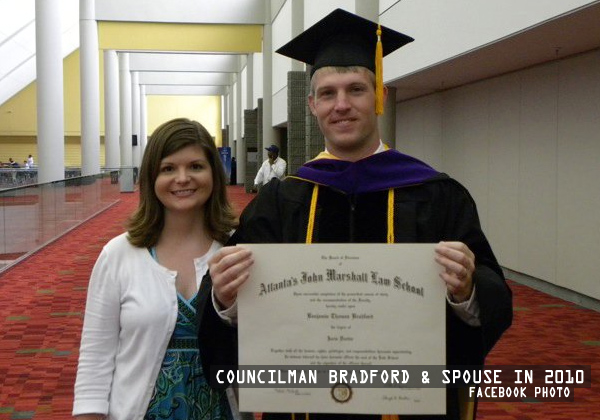
LU: Do you feel LaFayette has a positive relationship with the county’s general government or is there room for improvement? Have library funding problems and sales tax conflicts made things better or worse between the city and county?
Bradford: There is still room for improvement in our relationships but, ironically, the LOST and subsequent SPLOST negotiations have given us an excellent opportunity to forge relationships with the other governmental entities in our county. In particular, I was able to build a strong alliance with certain representatives of Lookout Mountain and Rossville during the LOST negotiations. Although LOST drug on for over a year, this alliance was ultimately successful in settling the SPLOST negotiations quickly and (almost) painlessly. The negotiations provided an opportunity for me to deal personally with the County Commissioner, and were a great opportunity for me to prove that I am a man of my word and that I desire to work together for the greater good. Although I cannot erase the past, I think that we are now in a new period of trying, cautiously, to begin trusting and working together again. For instance, the county is now allowing us to use their equipment once per month to patch the many pot-holes within the City.
LaFayette having a better relationship with other municipalities is positive, especially in light of the way some cities are treated by the county.
Councilman Bradford didn’t mention Chickamauga, probably for a reason, and is also a bit “squishy” in his answer regarding relationship with the county. Per OTHER city sources, county leaders (particularly County Attorney Don Oliver) have been hateful and derisive towards LaFayette, and city leaders fear Commissioner Heiskell will vindictively hold back SPLOST funds from cities that don’t toe the line in supporting her agenda(s). (That’s likely one reason Councilman Bradford has given a sideways answer to this question: to keep a bad relationship from deteriorating further.) The only real solution to better relationship between the city and county is to find a new Commissioner.
LU: What personal beliefs, philosophy, or other criteria do you use as a guide for making decisions as a council member?
Bradford: My family budget is fairly simple. We do not spend more than we make. We save for emergencies and we make conservative economic decisions. I treat the City’s budget the same way. I believe strongly that we should be MORE careful when we are spending taxpayer money than when we are spending our own money, and not the other way around.
LU: What sets you apart as the BEST candidate for Ward 2 Councilman? Why, in general, do you deserve continued voter support?
Bradford: I would like the opportunity to continue serving as councilman for Ward 2 because the past two years have been filled with learning and building experience. I feel that we are just now moving into a period where I can begin implementing things that I have worked towards for the past two years. If someone takes my place at this point, the learning curve will start over. I am afraid that all of our advances could be set back by a well-intentioned but uninformed new-comer. We are on the right path, but we are still in a time of change. I would urge the voters to allow me to see this through before making a change in the Ward 2 position.
LU: Is there anything else the community should know about you? Family, faith, philosophy, inspirations, etc.?
Bradford: I believe that the minutes of the council meetings from the last two years will show that I will always vote for what I believe to be right and not simply vote for what is popular. I desire that all of my actions honor God, my family, and my community. It is an honor to serve on the council, and I strive to have the heart of a servant.
![]()
Councilman Bradford always provides thoughtful answers to LU questions, and his participation in this Q&A is most appreciated. His candid comments about the city’s financial situation and utility rate issues shed some light into what’s gone on behind the scenes at City Hall for the last two years. A few of these responses (especially those dealing with the county) are a bit dodgy – lawyerly if you will – but he’s shared far more than the minimum.
During the last two years Bradford has on several occasions stood up to be the sole person voting against proposals other council members backed. He’s not always on the right side, but he’s shown a willingness to do what he thinks is right even when others disagree – a major change from the council of years past that would go along with anything.
What of Mr. Underwood, the challenger in this race? He’s 75-years-old, lives on Foster Mill Drive, and describes himself as a “construction contractor.” His wife, Sue, was billing clerk for LaFayette utilities for decades before recently retiring. Underwood served on the city’s Historic Preservation Committee and was responsible for much of the work building “Pocket Park” on the corner of Main and Withers several years ago.
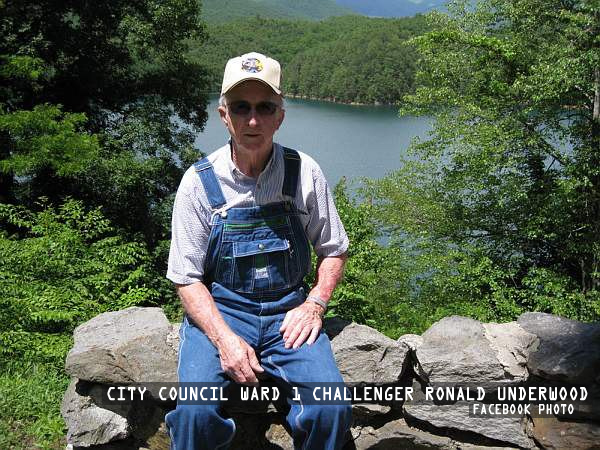
The biggest concern about Underwood as a candidate is the way he left LaFayette’s Historic Preservation Committee: in a hissy fit protest. Underwood and other members of the Committee resigned after the City Manager rightfully fired committee director Catherine Edgemon for incompetence. After stepping down from the Committee, Underwood shut down the Chattooga Academy Facebook page and spitefully threatened the end of walking tours, historic exhibits, and other projects he had been involved with.
Underwood, Edgemon, mayoral-candidate Mike Lovelady, and several others had been pushing the City Council to declare much of downtown a “Historic District” which would involve strict building codes and regulations. Business owners in the downtown area rejected the proposed plan, and their pushback is part of what resulted in Edgemon’s dismissal. The same Underwood who backed this plan as a Committee member would likely still back it as a more powerful Councilman, even though the stricter codes would likely kill many of the downtown businesses LaFayette has left.
Voters have to ask if Underwood’s motivation in running is to truly better LaFayette and bring the city into a better future, or just to revisit the rejected preservation plans and extract revenge for whatever injustice he perceives was done by the (now former) City Manager and current Council to Ms. Edgemon and the Preservation Committee.
In consideration of Bradford’s record on the council, his willingness to answer questions and listen to constituents, and Underwood’s possible ulterior motives for running, the Underground endorses Ben Bradford for reelection to LaFayette City Council Ward 2.
Election Day is November 5th. Early voting is being held every weekday 8:30-4:30 now through November 1st at the Walker County Courthouse elections office.
Q&A with Mayor Candidates Lovelady and Arnold will be posted October 25th.








